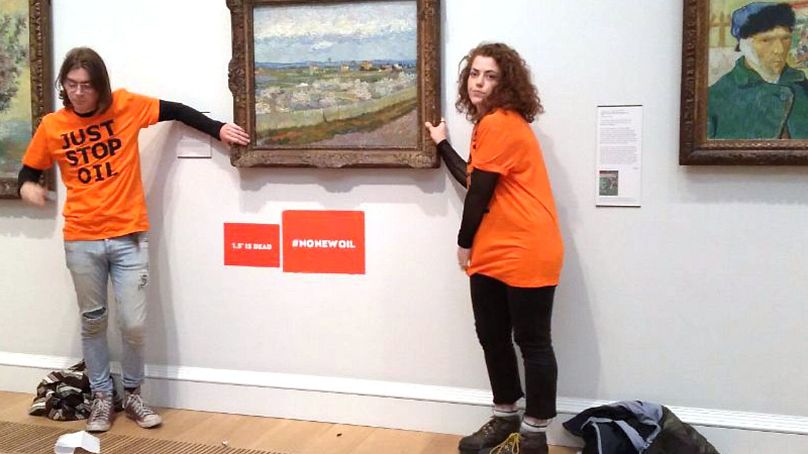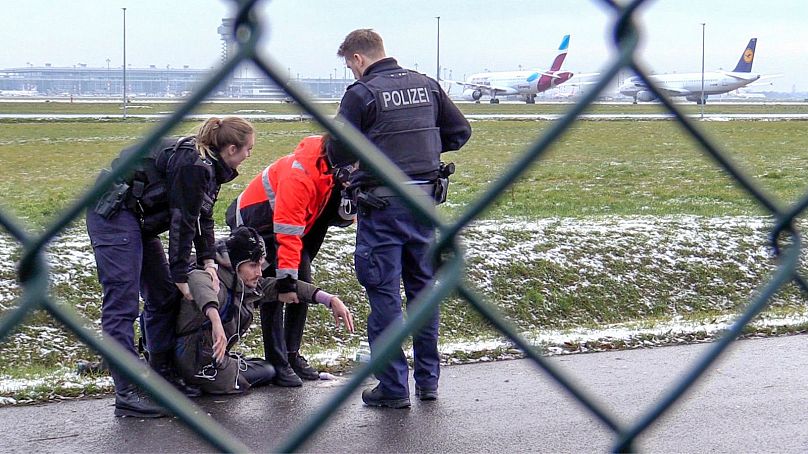Climate activists have made headlines around the world this year for their controversial stunts, but once the media attention dies down, what happens to them?
This has been the year of extreme climate protests.
 ADVERTISEMENT
ADVERTISEMENT
 ADVERTISEMENT
ADVERTISEMENT
Soup throwing, motorway blockading, bridge scaling, police station painting. 2022 has been filled with high-profile incidents that have divided public opinion and thrown the climate crisis into the spotlight.
But while the incidents themselves hit the headlines, the aftermath goes more under the radar. And the consequences for the people involved are stark.
We take a look back at some of the standout protests of 2022 and what happened afterwards.
Louis McKechnie: Goodison Park, Formula 1 and Van Gogh stunts
Louis McKechnie has had a busy 2022.
In March he tied himself to the goalposts during a Premier League football match at Goodison Park in Liverpool.
In June, he and another Just Stop Oil supporter glued themselves to a Vincent van Gogh painting at the Courtauld Gallery in London’s Covent Garden. "Sorry everybody, we don't want to be doing this. We're here glued to this painting, this beautiful painting, because we're terrified for our future,” he said at the time.
In July, he was part of a track invasion at the Formula 1 British Grand Prix at Silverstone.
In November, he spent his 22nd birthday behind bars in HMP Peterborough.
McKechnie is a member of Just Stop Oil, a UK climate activist group pressuring the government to stop granting new oil and gas licences.
He has been imprisoned since July, when he was taken into custody for breaching his bail. Since then he has been found guilty of aggravated trespass for his pitch invasion at Goodison Park and sentenced to six weeks in prison, where he will stay until his trial in February for a public nuisance charge.
Morgan Trowland and Marcus Decker: The QEII bridge blockade
Two climate activists, Morgan Trowland and Marcus Decker, climbed a major bridge in the UK in October, forcing police to stop traffic. Like Louis, they are members of Just Stop Oil and were calling for an end to new oil and gas licences.
They scaled the QEII bridge in London and stayed there for 36 hours.
They have been in custody since the incident and are facing a public nuisance charge, which they have both pleaded not guilty to. They will stand trial from 27 March 2023.
In a letter from prison, Decker describes how he seeks out nature in confinement.
“The yard we run in has a real patch of grass everyone walks around. I’m the only one running… I’ve been picking up litter there many a time and received a ‘positive’ for it the other day,” he writes.
“I’ve managed to create plant life in my cell by sprouting sunflower seeds, yum!” he adds. His other comforts come in paper form: pictures of animals cut out of newspapers, and “lovely cards” people sent.
Last Generation: Munich and Berlin airport runway blockades
Germany has also seen a wave of civil resistance this year to demand urgent action to combat the climate crisis. The environmental group Last Generation (Letzte Generation) has led the charge with dozens of protests and stunts leading to numerous arrests.
Earlier this month members of the group took their protest against cheap air travel to two of Germany's largest airports in Berlin and Munich, blocking their runways and bringing air traffic to a standstill.
Activists from Last Generation called on the government to stop subsidising air travel and to expand cheap train travel offers instead.
In the aftermath Munich announced that it would ban all climate-related gatherings aimed at blocking key roads and other areas for at least a month.
The general order, running from 10 December until at least 8 January, is aimed at ensuring "that the main routes for emergency and rescue vehicles in the city area are kept clear at all times and to avert possible harm ... that could arise due to delays in emergency travel," the city said in a statement.
Phoebe Plummer and Anna Holland: Van Gogh soup throwing incident
It was the most high profile stunt by a climate activist this year.
Phoebe Plummer and Anna Holland from Just Stop Oil made waves across Europe when they dumped tins of Heinz tomato soup across Vincent Van Gogh’s ‘Sunflowers’ painting at London’s National Gallery in October.
“Are you more concerned about the protection of a painting or the protection of our planet and people?” Plummer yelled during the incident.
Whatever you think about the approach, it is undeniable that these two tins of soup got millions of people talking. Videos of the protest went viral and were picked up by the media internationally.
And they have also landed the two activists in hot water. They remain on bail ahead of a plea and trial preparation hearing on 9 January. The painting itself was undamaged as there was a protective layer of glass around it, but it is claimed that the frame was damaged during the stunt.
Plummer has also gone viral online in a video explaining her actions and has appeared on the BBC’s Newsnight programme.
Belgian climate protesters: Girl with a Pearl Earring
Following the Van Gogh soup throwing protest, artwork became a regular target of climate activists.
Protesters say that all the artwork they’ve taken aim at has been protected by glass so no damage has been done.
However, a joint statement by the International Community of Museums (ICOM), cosigned by nearly a hundred gallery directors, said the activists “severely underestimate the fragility of these irreplaceable objects, which must be preserved as part of our world cultural heritage.”
A pair of Belgian protesters targeted Johannes Vermeer’s ‘Girl with a Pearl Earring’ painting in the Netherlands in October. One of the men glued his head to the glass protecting the 17th-century masterpiece at the Mauritshuis museum in The Hague. Another poured a can of tomato soup over his head and glued his hand to the wall beside it.
They were sentenced to two months in prison with one month suspended. Their identities were not released in line with Dutch privacy regulations.
Why are climate protestors across Europe resorting to extreme stunts?
The world is in a climate emergency. We must halve emissions by 2030 in order to avoid the worst effects of the climate crisis, according to the latest report from the UN's Intergovernmental Panel on Climate Change (IPCC). Yet the world’s governments are failing to implement policies that will achieve this goal.
You may disagree with the acts carried out by these protesters this year, but halting the disastrous and mounting effects of the climate crisis is something we should all surely get behind.












